Crossing Divides: 'Reading bedtime stories helped me survive prison'
- Published


Lewis Hardy was struggling in prison, feeling isolated from his young family and increasingly "cold". Then he was shown a way of doing something that many parents take for granted - reading to his children - and everything began to change.
Lewis Hardy had just been released from prison and was getting a taxi home to see his two sons for the first time in nine months, when he got the call he dreaded.
"What are you up to?" a familiar voice enquired.
"I'm just in a taxi to see my boys."
"Don't worry about that," said his old friend. "See them tomorrow. Come to the pub with us lot."
But Lewis knew exactly what to say.
"I ain't ever going to the pub with 'you lot' ever again. My kids are more important."
Prisoners get a lot of time to think, Lewis says, and he'd figured out what was the right decision for him.
When he got home his sons, aged six and five, jumped up on him so fast he nearly fell over, he recalls.
He couldn't wait to do so many things with them after such a long time apart.
But top of the list was reading to them.
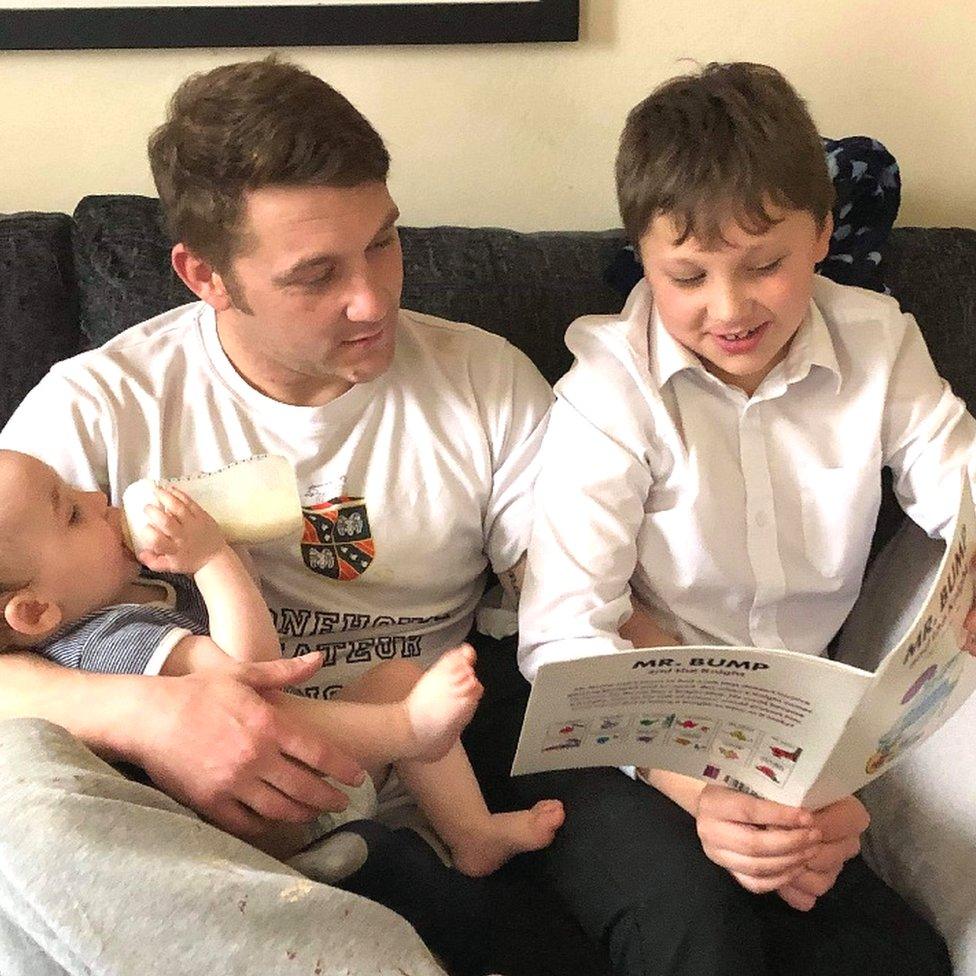
Lewis reading in 2019 with his eldest son and his third son, born last year

It took a period in prison to remind Lewis of the joys of reading.
Born and bred in Plymouth, he'd got into a fight while drunk in 2013, and been sentenced to two years in Dartmoor for grievous bodily harm.
It was not out of character for him at the time, he admits - from an early age he had struggled to deal with his aggression.
But from the moment he was sent to a remand centre, he realised just how tough his new environment would be.
Fights broke out the first time prisoners were let out into the yard, he says, and "someone was slashed".
Prisoners made knives by combining toothbrushes with razors and you might be slashed for something as petty as an argument over a cigarette paper.
"It was like masculinity to the maximum and so you were always on edge," he says.


In Dartmoor itself he says you could "cut the atmosphere with a knife".
"Every time the doors are unlocked it's only a matter of time before something happens, whether it's to you or to someone else."
Violent criminals and their friends were constantly trying to figure out if someone had a weakness to exploit, either physical or mental.
Lewis managed to avoid trouble, but it was stressful.
"You had to stand your ground and you were always trying to figure out how to distance yourself from those sorts of things."
So while going to prison is "never lucky", he says, he considers himself fortunate to have been signed up for a programme called Storybook Dads.


This gives prisoners with young children a chance to spend time in a studio recording bedtime stories, which are then sent to their families at home on CD or DVD.
"As soon as you walked in through the doors, it was just complete relaxation, you felt safe," remembers Lewis.
For his own family he was producing one per week. He would read stories like the Gruffalo series by Julia Donaldson. He would also sometimes read Marvel comics from the prison library, holding up the images in front of the video camera.
He even drew his own comics, and sent these to his children.
The first thing Lewis realised was that the stories were helpful at home, for his partner and two sons.
"My missus was having a bit of time settling them at night," says Lewis.
But she could play his recorded stories and this would help to soothe them.
They told him that after listening to his voice "it felt like I was in the room with them when they closed their eyes."
He was also pleased to hear that his sons would sometimes sit down together to listen to the stories, when they were missing their father.
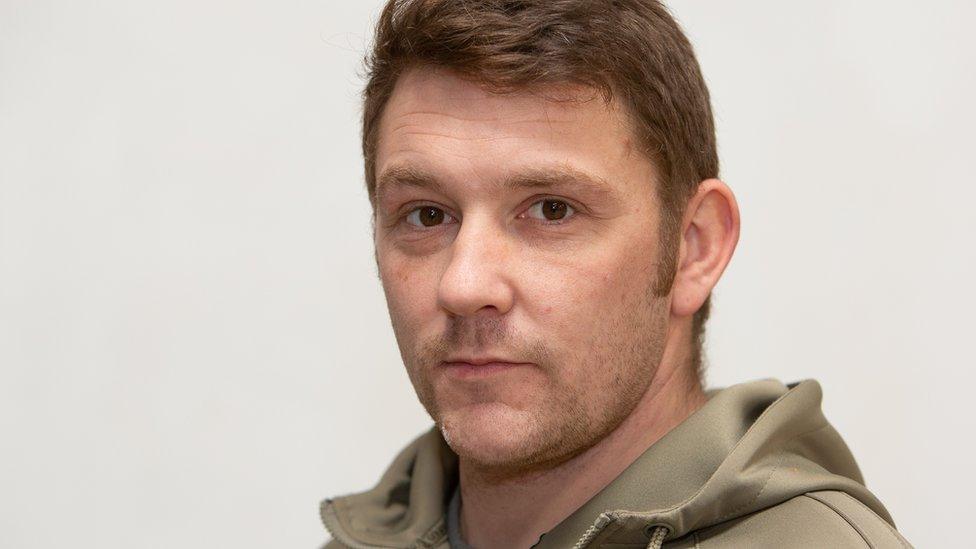
Lewis had neglected to read much to his sons before he went to prison - they were six and four when he was sent down. But Storybook Dads was reconnecting him to something from his own childhood.
"It's funny, but reading had been a big part of my childhood," he says.
"My mum used to read to me a lot. And from the age of about nine, when I found out I was dyslexic, I got really into reading, until my misbehaving started in my teens. I loved a series called Animorphs and read the lot of them."
Learning about the impact of his stories at home spurred Lewis on to do more. And not only did the stories delight his children - they did something for the story-teller too.
"It's hard to explain the feelings you get in prison," says Lewis.
"You don't ever get a cuddle off anyone, you don't even get a shake of the hands, you miss that love from your kids in their eyes, you start to feel quite cold every day.
"If you have a visit and someone cuddles you, it's the warmest feeling you can ever imagine, it's like an electric blanket around you."
Reading stories for his children brought some of that warmth back into his life.
"It's massively important for someone who wants to be rehabilitated," Lewis says.

Sharon Berry, the founder of Storybook Dads, soon noticed inmates' need for these warm feelings when she started visiting prisons.
She had studied radio production as a mature student and dreamed of writing radio plays. As she worked towards that ambition, she took some work volunteering one day per week at Channing Wood prison, helping it to set up a radio station. She was surprised by what male prisoners would talk to her about when given the chance.
They opened up about the pain of missing their children, the guilt of missing milestones like birthdays, toddlers' first steps or first days at school.
She saw phone calls home that ended in tears as prisoners found out about the family life that was passing them by.
This was how the idea of Storybook Dads came to her: it would be a way for prisoners to maintain family ties, while gaining media production skills that might help them rebuild their lives once outside prison, reducing the risk that they would offend again.
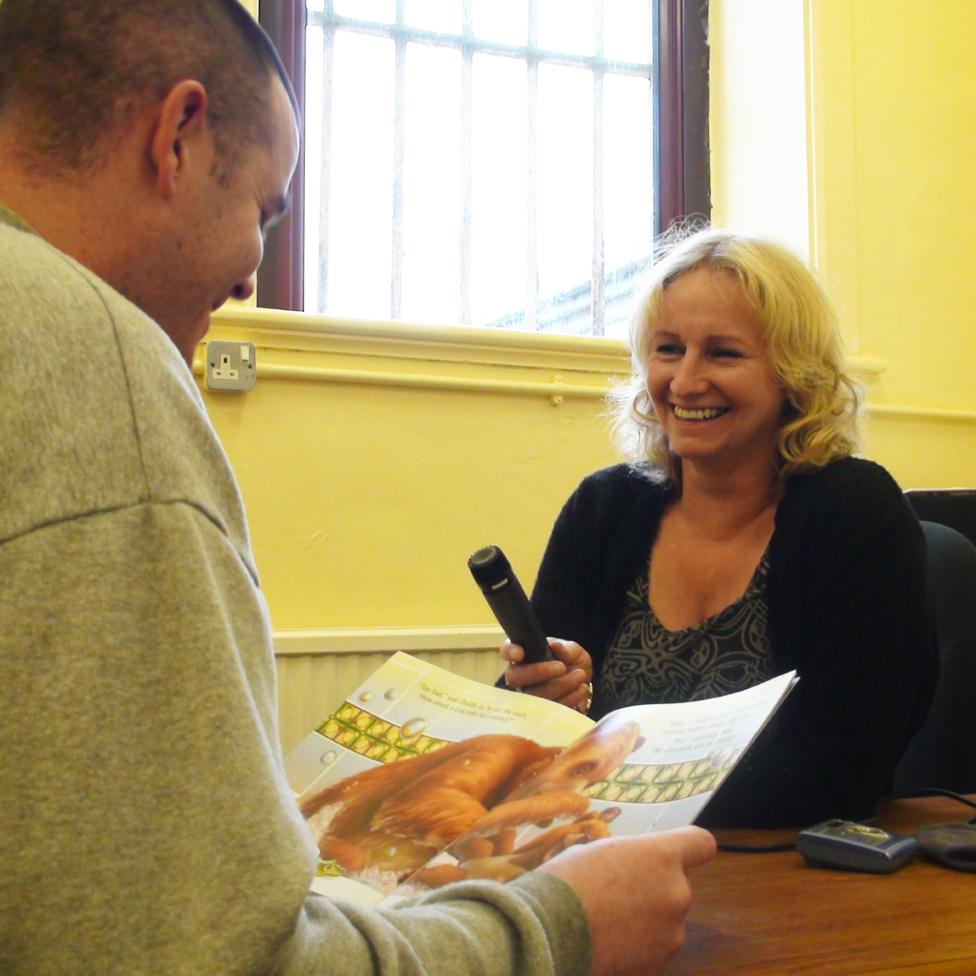
Sharon Berry records a story with a prisoner

She set up her charity in 2003 in Dartmoor prison. The first room they were allocated as a recording studio was an empty prison cell.
Sixteen years later, about 100 prisons work with the charity, generating between 5,000 and 6,000 stories a year. (The charity also works with some female prisons, under the name Storybook Mums.)
Behind their tough facades, many prisoners struggled to make their recordings, Sharon noticed.
"It's a macho environment on the wing, you can't show any weakness. By contrast, our studio space is nurturing and supportive - they get in touch with that dad side of themselves. Shedding that macho image for a brief period of time made them feel vulnerable."
She saw many prisoners break down as they tried to record short personal messages to introduce their stories.

Find out more
Listen to Lewis Hardy talking about his experience of reading children's books in prison in this report from Outlook on the BBC World Service
Download the Outlook podcast

But there was something else the prisoners seemed to struggle with.
Some prisoners would be sweating by the time they finished reading Hansel and Gretel or Little Red Riding Hood, and Sharon thinks she knows why.
"It's daunting for these young men," she says. "Very often they weren't read to as children themselves, so this was new to them. They come in to the little studio to read Goldilocks and they're embarrassed, they don't know how to do it, and a big part of it is helping them to relax."
Lewis, who learned to edit the recordings made by other prisoners as well as recording his own, agrees that some prisoners struggle with the act of reading. Some may also have had very little contact with their children, he adds.
The only time he personally felt stressed came when he was filming DVDs, using children's puppets as props.
"You had the other prisoners watching you perform the story. You see, prison pulls you back to that old mentality from school. 'Will these people take the mickey out of me afterwards?' Men can be immature."
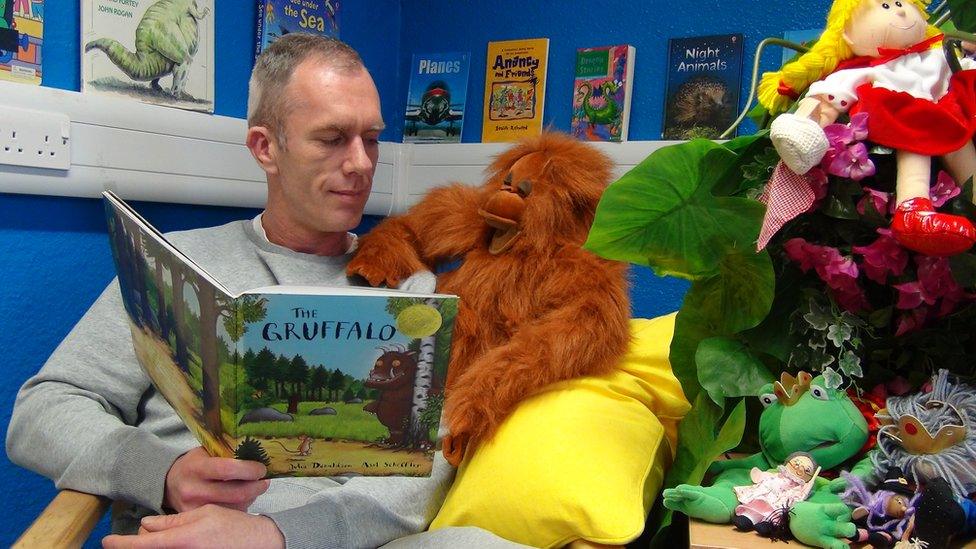
A prisoner records a DVD while reading a story for his family
However, many prisoners find that the positive impact of their stories gives them the confidence to do more, Sharon says.
Prisoners would hear that their children were so proud of the stories that they took the recordings to school to show their friends. They couldn't wait for the sequel.
"It showed the children that they are loved and not abandoned," says Sharon.

More than five years after leaving prison, Lewis has not re-offended.
He has returned to his job as a fencer and branched out into property care services. Occasional periods of work with Storybook Dads have helped him through periods when work has been scarce.
He has given up drinking and welcomed a third son into the world last year.
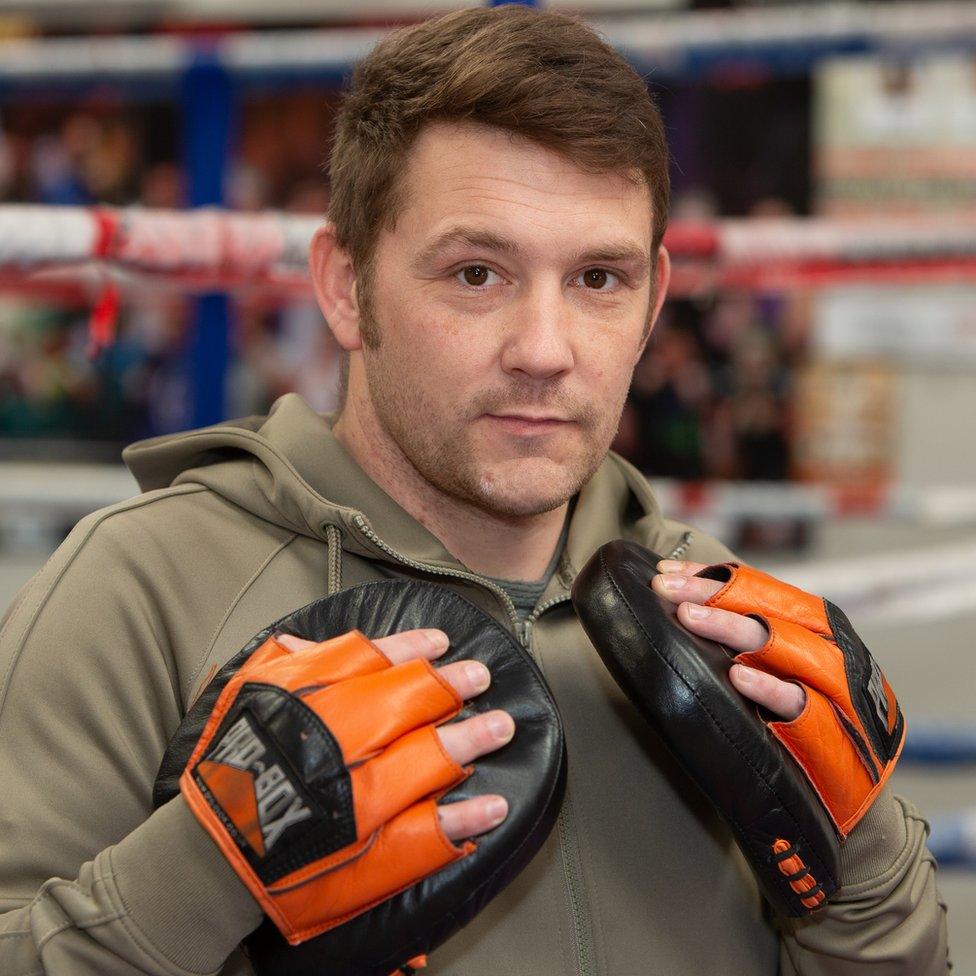
Lewis Hardy coaching at a local gym

He also took up boxing at an amateur gym to channel his aggression, though problems with his hip have pushed him into coaching instead.
Reading with his children remains one of his favourite activities.
With his elder son he is working his way through the Harry Potter collection. They haven't reached the sections about the prison of Azkaban yet, he says. But when they do, he plans to use it as a "shock tactic", a way to start conversations that will steer his son away from the life he was tempted to go down.
"I will tell him the truth about prison, how horrible it is," says Lewis.
And he will also tell him how it was the joy of reading that helped him to rewrite the plot of his life.
Follow Dougal Shaw on Twitter: @dougalshawbbc, external
BBC Crossing Divides

A season of stories about bringing people together in a fragmented world.
You may also be interested in:
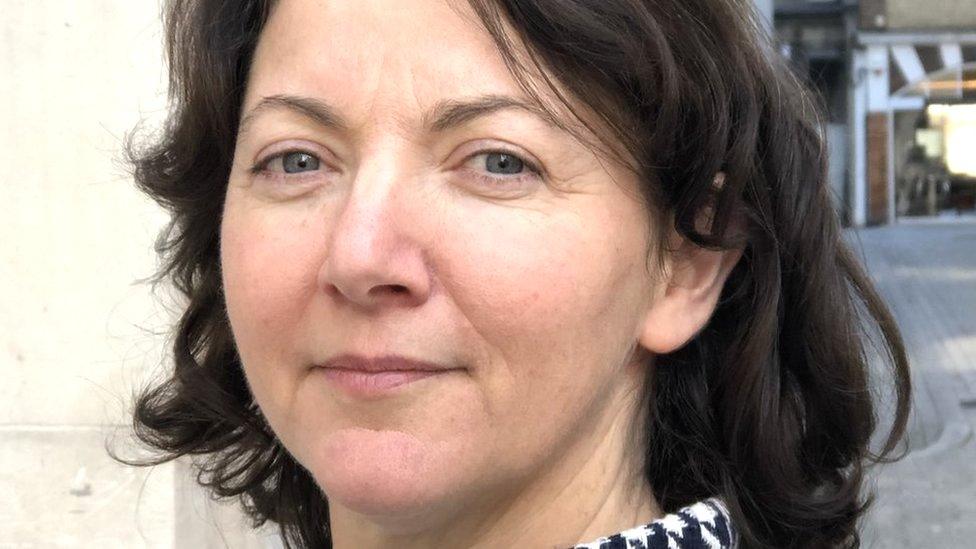
Gaby Eirew suffered two big bereavements in the space of a month. The experience impelled her to find a way of prompting parents to record video messages for their children. It also helped her to heal a deep wound in her personal family history.
Join the conversation - find us on Facebook, external, Instagram, external, YouTube, external and Twitter, external.
